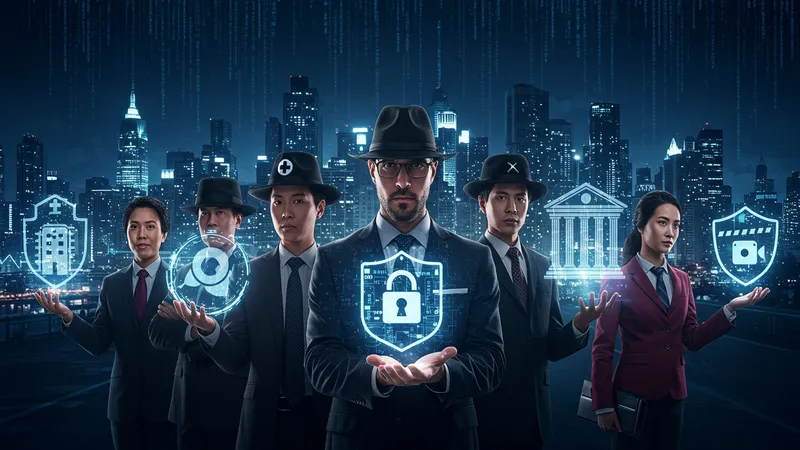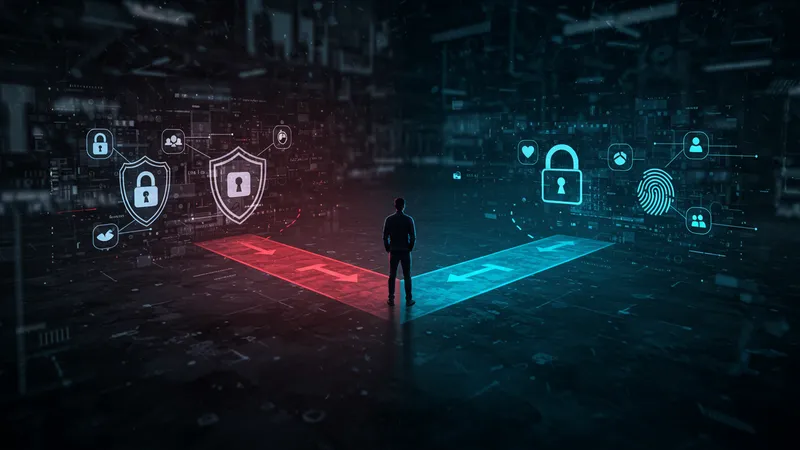

Did you know a cybersecurity degree can accelerate your career like a rocket launching from Cape Canaveral? For those seeking a future-proof career, understanding what's at stake is more crucial than ever.
As our digital footprint grows relentlessly, the demand for cybersecurity professionals continues to soar. But there's a lot more to this story, and what we're about to reveal could reshape your career dreams.

Most people think a degree in cybersecurity is all about rolling up your sleeves to battle digital crises. But here's a shocker: the curriculum also covers ethical hacking, compliance regulations, and even psychology. These courses aim to develop well-rounded professionals capable of anticipating and outsmarting cyber threats before they even occur. But that's not even the wildest part…
Cybersecurity job openings are projected to grow 33% by 2030, outpacing most other sectors. Why? Because every company, from a fledgling startup to a titan of industry, realizes they need a fortress as secure as Fort Knox. With courses designed to match these intricate needs, you won’t just be learning how to prevent breaches — you'll be among the elite crafting impenetrable networks. The revelations don’t stop there…
If you thought that was jaw-dropping, what happens next shocked even the experts. Are you ready to discover the untapped potentials of a cybersecurity career? Hold tight — this is where it gets really interesting…
The cybersecurity sector is experiencing explosive growth that resembles the tech boom of the early 2000s. With threats escalating in complexity, industries across the board are investing in safeguarding their data. More fascinatingly, the need for these professionals is not confined to tech firms but extends into healthcare, finance, and even entertainment. However, there’s one twist you need to know…

Industries are searching for professionals who can wear multiple hats, combining technical acuity with business insight. Take banks, for example. They require cybersecurity experts who can also manage regulatory compliance — a task that demands understanding both technology and finance. What you're about to find out might change your perspective on this dynamic field forever.
But there’s something else. As companies race to protect themselves, cybersecurity specialists are not just in demand; they are commanding premium salaries. This shift isn't just about money but about how much value these professionals bring to the table. Curious about what this means for your career trajectory? Keep reading, because the surprises keep coming…
Degrees are evolving to keep pace with these industry needs, incorporating AI and machine learning into their modules. Such augmented learning not only makes graduates tech-savvy but equips them with the tools to predict and mitigate threats that haven't even been imagined yet. And that's not the end of the story...
Dive into a cybersecurity program today, and you might be surprised to walk into a class discussing human behavior. That's not a mistake — it's a well-thought-out strategy. Understanding how humans interact with technology is critical to anticipating security lapses. Surely this wasn’t something you expected from a tech-focused degree?

Forensic computing is another component that often takes students by surprise. The ability to trace a cybercrime trail is akin to detective work in the digital realm. Such skills are crucial as cybercriminals become more adept at covering their tracks. But wait until you learn how this fits into the broader security tapestry…
Consider the course on ethical hacking, an intriguing yet controversial aspect of the curriculum. It isn’t about wreaking havoc but a sanctioned, strategic approach to identifying vulnerabilities before the malicious hackers do. The goal? To think like a hacker to beat the hacker. But what’s uncovered next will redefine your understanding of cybersecurity education…
Recently, universities are adding modules on IoT security, preparing students to shield the ubiquitous smart devices that have become part and parcel of modern life. This adaptation ensures that graduates remain relevant in an ever-evolving digital world. Continue reading to unveil more game-changing insights…
Artificial Intelligence is not just the future—it's the present. Integrating AI into cybersecurity is revolutionizing how threats are detected and neutralized. Imagine an AI system that predicts an attack before it happens, using patterns it has learned from countless previous incidents. Is this the magic wand the cybersecurity world has been waiting for?

AI-powered tools can digest massive datasets in milliseconds, spotting anomalies that would take humans hours to notice — if they notice at all. This means faster response times and, crucially, fewer successful attacks. But wait, AI's influence on cybersecurity doesn't stop here…
Machine learning algorithms customize security protocols on the fly, adapting to new threats as they develop. This isn’t merely about using technology; it's about technology that learns and evolves, building defenses that are smarter and more resilient than ever. Ready to discover how this shifts the cybersecurity landscape?
Yet, despite its promise, AI introduces new risks. As cybersecurity defenses grow more sophisticated, so do the capabilities of attackers to exploit AI systems themselves. Navigating these risks while harnessing AI’s potential presents a thrilling challenge — a challenge that could define your career. Let’s delve into how these complexities could impact you…
When you step into cybersecurity, you entertain not just technology but also profound ethical considerations. The power to access or restrict information comes with immense responsibility. The core of this dilemma? Balancing security with privacy. In an age where data is the new gold, how do we ensure it’s safeguarded without encroaching on individual rights?

Courses addressing ethics in cybersecurity often delve into scenarios that demand a nuanced understanding of legality versus morality. Should companies have limitless access to employee data for security's sake? These discussions form part of a comprehensive academic curriculum — shaping professionals who can navigate these gray areas with tact. But there's more beneath the surface…
As governments worldwide ramp up cybersecurity measures, they often face backlash for infringing on civil liberties. This introduces a complex landscape where national security interests collide with personal freedoms. As a student, how you approach these issues can define your career and influence legislation. Discover the key to balancing these scales…
These are not just matters of discussion but pivotal topics that require action-oriented solutions. Understanding the ethical landscape is vital for those who aim to lead in the cybersecurity field, ensuring that security progresses without sacrificing integrity. But the saga continues, uncovering even more layers to this multifaceted profession…
The job market for cybersecurity professionals is sizzling hotter than ever. With cyber threats showing no signs of abating, job roles are continually expanding beyond traditional boundaries. New positions blend roles like cybersecurity analyst with data engineer, broadening the skill set and opening more doors. But that's not the full story…

With increased demand comes increased earnings. Entry-level salaries often surpass those in other tech sectors, and the potential for rapid advancement is unprecedented. Certifications further hiking pay scales, such as CISSP and CEH, easily translate into more digits on that paycheck. Let’s explore why this signals a paradigm shift…
Remote work has further diversified opportunities, enabling professionals to work with global giants while living miles away from the city hubbub. This flexibility is not just convenient — it’s become a competitive edge. Imagine a career that offers geographical freedom paired with substantial security…
However, this boom isn’t infinite. Global competition is fierce as skilled workers from around the world enter the fray. Developing a unique skill set can catapult your resume from the stack to the spotlight. Keep scrolling as we decode the strategies to keep you ahead in this race…
Wondering how to jump-start a career in cybersecurity? The path can seem daunting, yet several strategic steps can illuminate your way. Starting with a degree offers foundational knowledge, but internships offer a golden opportunity to acquire hands-on experience with real-world applications. You might wonder, why is this hands-on experience critical?

Networking also plays a key role, with platforms like LinkedIn offering endless possibilities to connect with industry veterans who can provide mentorship and guidance. Becoming part of cybersecurity events and communities also presents an avenue to learn directly from the trailblazers. But there’s an extra piece to this puzzle…
Continuous education cannot be overstated, as digital threats evolve at a breakneck pace. Certifications like CompTIA Security+ or Certified Ethical Hacker serve not just to bolster your resume but to signify your commitment to staying ahead of the curve. What happens when passion meets specialization? A future-proof career, that’s what.
Regardless of where you are, breaking into cybersecurity demands perseverance, curiosity, and a willingness to keep learning. It’s a landscape that rewards those ready to adapt — a thrilling arena where your actions today shape digital safety for tomorrow. Excited to transform this career path into your arena of expertise?
One of the most alluring aspects of a cybersecurity career is the reward, both intangible and tangible. Beyond the impressive salaries, the intrinsic satisfaction of protecting sensitive information gives purpose and meaning to your daily grind. Can protecting the world from cyber threats lead to both a fulfilling and lucrative career?

The path isn’t without its challenges, but therein lies its charm. Tackling new forms of cyberattacks demands creative thinking, and the joy of outsmarting a hacker brings its thrill. The game of cyber cat and mouse promises a lifetime of learning, excitement, and growth. But let’s peel back another layer…
Beyond the adrenaline rush, there is immense respect associated with the role. Companies and clients entrust cybersecurity professionals with their most valuable assets. This trust drives professionals to innovate continuously, striving for excellence. Ready to be part of an elite cadre influencing the future of cybersecurity?
Yet, the rewards aren’t just inside the barrel of paycheck figures or industry recognition. The career echoes significance in protecting privacy, combating cybercrime, and ensuring digital harmony. Sound intriguing? There’s still more unraveling to be done as we journey through the next spectrum…
While the allure of a career in cybersecurity is unmistakable, understanding its challenges is crucial. The constant change in threat landscapes demands relentless learning and vigilance. Mistakes are not just costly in this field; they’re catastrophic. How do professionals navigate these turbulent waters with confidence?

Burnout is a real risk, with professionals frequently grappling with high stakes and immense pressure. In this pressure cooker environment, mental fortitude is as essential as technical prowess. The importance of work-life balance becomes glaringly apparent — but can balance truly be achieved here?
Another obstacle is keeping up with the rapid advancement of technologies. While new tools offer improved defense mechanisms, they also require continuous learning curves. This field isn’t just a career; it’s a lifelong commitment to education and adaptation. How can one prepare to thrive amidst this torrential pace?
However, understanding these challenges is the first step in overcoming them. They allow professionals to grow and innovate, pushing boundaries ever further. Ready to tackle these challenges head-on? We’re steering towards the resolution of this riveting saga…
The demand for cybersecurity extends beyond traditional tech industries; every sector globally can benefit. From education to agriculture, the digital age has woven technology into every facet of life. Why is cybersecurity no longer just the concern of IT departments?

Consider the healthcare sector. Cybersecurity for hospitals isn’t just about data protection; it involves safeguarding life-saving medical devices connected to networks. The ramifications of a breach are catastrophic — a digital security compromise could easily transcend into physical harm. Such stakes redefine priorities entirely.
The energy sector also requires robust cybersecurity solutions. Smart grids, while efficient, are vulnerable to attacks that could cripple entire cities. It’s a dire reminder of the delicate balance between technological advancement and potential vulnerabilities. Preparing adequately is paramount.
Even the education field, once thought unrelated, heavily leans on cybersecurity. Online records, intellectual property, and campus safety now hinge upon digital security measures. The digital landscape is vast, but with great technology comes great responsibility — a responsibility you could help bear. What will you contribute to strengthening this framework?
In cybersecurity, it’s common to associate proficiency with hardcore tech skills. However, interdisciplinary skills can significantly amplify one’s impact. Sociology, psychology, and law are just a few disciplines benefiting security experts. How do these diverse areas enhance a cybersecurity professional’s effectiveness?

Understanding human behavior is paramount in anticipating potential security breaches. Skills from psychology help in designing systems that account for human error — a leading cause of cyber incidents. But don’t just take our word for it; explore how these insights transform defense strategies…
Legal knowledge in fields such as compliance regulations and intellectual property law are pivotal. With data breaches leading to profound legal repercussions, cybersecurity teams equipped with legal acumen have the upper hand. This knowledge can be a differentiator in the hiring process.
The art of communication cannot be overstated when conveying technical concepts to non-technical stakeholders. Bridging this gap ensures clearer strategies and smoother implementations. So, what if you could marry these skills seamlessly into a robust cybersecurity career? The possibilities are endless; let’s continue to explore these junctions of expertise…
As we reflect upon a journey divergent with opportunities and considerations, one thing is glaringly apparent: cybersecurity is not just a career — it’s a commitment to the future. The evolution within this realm offers challenges that test perseverance and ingenuity, rewarding those willing to stretch their boundaries with endless potential.
Whether you’re standing at a crossroads in your career or paving a newly envisioned path, the insights shared compel you to act, to prepare, and to venture boldly into the cybersecurity domain as a protector of our modern digital landscape. Share your thoughts, mark this dialogue, and engage in the dynamic dance of securing tomorrow, today.